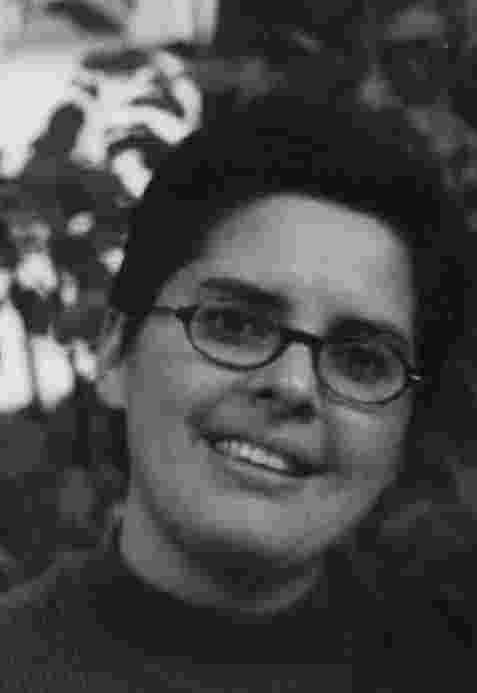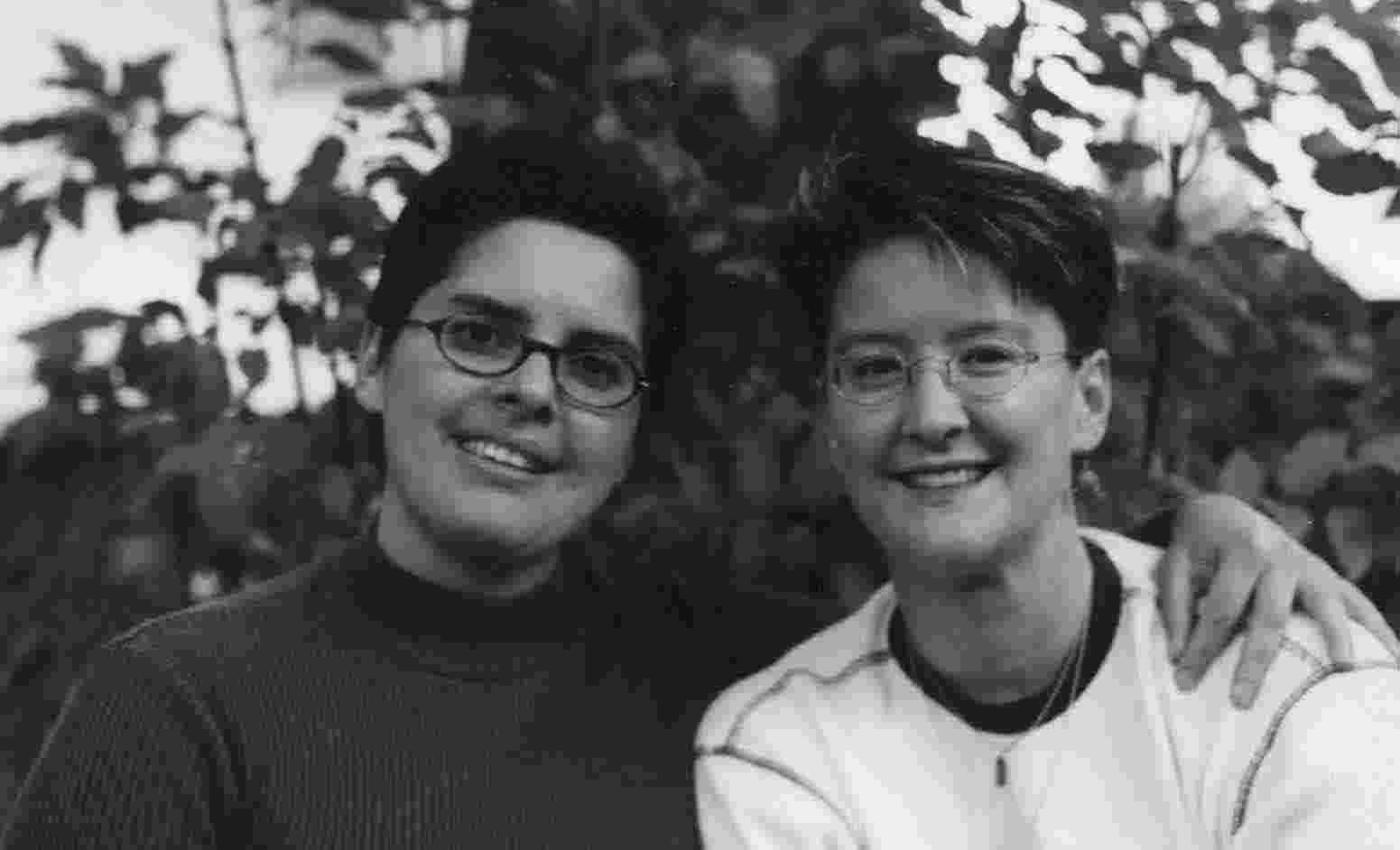 Marta
Donayre Marta
Donayre
On February 19th, 2002, Marta Donayre was
granted sexual-orientation-based political asylum in the United
States, which illustrates that the INS is aware of the extremely
dangerous and volatile environment towards gays and lesbians in
Brazil, and that they acknowledge that if Marta were to return
to Brazil to live openly as a lesbian, her life would be in
danger.
We feel very fortunate
that our personal fight is over. However, the fight for rights
for couples just like us is NOT over. We will continue to
advocate for rights for same-sex binational couples and to raise
awareness of others who are not as lucky as we have been.
Marta Donayre and Leslie
Bulbuk have been tremendously impacted by the current
immigration laws in the United States, which deny immigration
rights to committed same-sex and unmarried opposite-sex couples.
On April 6, 2001, Donayre lost her job and with it the privilege
of living and working in the United States. If Donayre and
Bulbuk were an opposite-sex couple, they would have never have
had to deal with the imminent forced separation they faced at
the time. They could have gotten married and Bulbuk could have
sponsored Donayre. Bulbuk's frustration was tremendous because
her freedom as an American citizen to build a family of her
choosing was denied. She realized that she is a second-class
citizen suffering the cruel and unusual punishment of having her
family torn apart by issues totally unrelated to the family.
Fortunately Donayre found a job at a company that sponsored her,
enabling the couple to remain together.
Previous to this, Donayre
and Bulbuk faced similar fears when in March 13, 2000, i2
Technologies announced the acquisition of Aspect Development. At
the time, Donayre worked for Aspect Development and feared that
she would be laid off. Fortunately this did not occur.
A little over a year after
this frightening event, Donayre and Bulbuk were hit by the
realities of the dot-com crash, and Donayre, along with 700
fellow employees, was laid off from Ariba Inc. According to
obscure INS rules and policies that have never been declared as
official by the INS, H-1B visa holders have only 10 days to find
a new job or to leave the country. This task proved almost
impossible given the economic conditions propelling companies
nationwide to conduct massive layoffs.
Fortunately a new job
appeared a week before Donayre was planning to return back home
to
Brazil. This was a blessing to their family, which managed
to remain intact for the time being. Unfortunately, the economic
crisis still has not calmed, and Donayre's current employer is
not immune to its force and the company already had layoffs
after she joined. Fortunately Donayre was not included this time
around, but she she may be in the future if further layoffs are
needed leaving couple exposed to external influences-such as the
economy, senior management, and the INS to dictate their future.
Needless to say, the recent terrorist attacks on U.S. soil have
worsened the economic environment placing the family's stability
at a greater risk.
At tremendous personal risk,
Donayre and Bulbuk realized that it was time to take a stand and
come forward with their story in order to show the American
society the injustices that same-sex couples face. This issue
takes a daily toll on their family as a whole. Plans and dreams
must be put on hold, as they have no choice other than to sit
back and watch while corporations, the economy and the INS
decide their fate. Even if they managed to find that one safe
corporation that would sponsor Donayre, they would be at the
hands of this corporation for many years, since the green card
process is long, bureaucratic and painfully slow. Were they an
opposite-sex couple, none of this agony would be necessary since
they could marry and solve this dilemma. As an American Bulbuk
feels that denying her the ability of sponsoring her partner is
de facto government intervention in her pursuit of happiness.
The passing of the Permanent Partners Immigration Act (PPIA),
H.R. 690, currently stalled in Congress would solve this.
Donayre and Bulbuk are not asking for same-sex marriage. They
are simply asking that their relationship is recognized for
immigration purposes, as is the case in 15 other countries.
Marta and I had been dating for a little over a week, when we
first felt the sting of discrimination against same-sex
binational couples. Today, our story has a happy ending, but we
had to endure the possibility of losing the relationship we were
just beginning to build.

Their
Story: Love Sees No Borders’ Marta Donayre (left) and
Leslie Bulbuk
On March 13, 2000, Marta, who is Brazilian, was employed at a
Silicon Valley software company. That morning started out like
most other mornings. Marta was on her way to work, listening to
local radio, when she heard that her company was about to be
acquired by a much larger company. As is common when these kinds
of corporate acquisitions are announced, Marta feared there
would be layoffs, due to job duplications.
She immediately called and woke me up, and told me that I should
find myself a nice American girl, someone who wouldn’t have to
leave the country if she lost her job. I told her I had no
intention of doing so. But this was just the beginning of what
would be two years of stress and turmoil due to US immigration
laws.
We were lucky that time. Marta kept her job, and about six
months later, she—and her H-1B visa—were transferred to another
job, at a company which promised an eventual green card in its
offer letter to Marta. After about six months at this new job,
however, in April of 2001, Marta was laid off. Our hopes that
she would be able to stay in this country, with the economy now
in a tailspin, were diminishing.
We received confusing and conflicting information. One human
resources person told us Marta had 20 days to find a new job or
leave the country; another told us 30 days; and yet another said
it was 60. At the same time, we saw an article on Wired.com in
which an INS spokesperson stated that laid-off foreign workers
had an unlimited amount of time to find a new job in the US.
These statements were retracted a few days later, in yet another
article.
We realized we needed some solid answers. That is when Marta and
I discovered LGIRTF, which holds free legal clinics in San
Francisco. We spoke to a lawyer, and were told that,
“unofficially,” Marta had 10 days to find a new job or leave the
country.
We were lucky once again. Marta found a new job in an absurdly
short period of time, and was able to stay, though prospects for
a green card were slim. It was at this point, after untold
stress, that we realized that no matter what occurred in our
lives, the clock was ticking. Even though Marta once again had a
sponsor for her H-1B visa, and we were “safe,” we knew we had to
break our silence on this issue.
We became active in LGIRTF, first by beginning to attend
meetings of the San Francisco chapter, and soon after that, by
beginning our own organization, Love Sees No Borders. Our
mission was to bring attention to the issue of same-sex
immigration, an issue that affects countless thousands of
binational couples in the United States. So many people within
the LGBT community don’t even realize that our community has no
right to sponsor a partner for immigration, and even fewer know
that there is currently a bill in the House of Representatives –
the Permanent Partners Immigration Act – that would grant us
this important right that opposite-sex couples take for granted.
Even as we became activists, we formulated a backup plan, should
Marta not be able to secure a green card through an employer. We
began the process of filling out paperwork to move to Canada,
something no US citizen should have to do in order to remain
with his or her partner. Another potential option we had to
consider, albeit a risky one, was asylum. We interviewed three
immigration attorneys in San Francisco in September, 2001, chose
one, and Marta helped them build a solid case by doing a lot of
her own investigative research.
Brazilian society is notoriously homophobic, despite having some
very pro-gay laws on the books. One of the challenges facing
Marta was that most of the documentation about anti-gay abuses
in Brazil told the stories of gay men. There was little
documentation of abuses against lesbians. Our guess was that
anti-lesbian abuse gets categorized as violence against women,
not as violence against lesbians.
On February 4th of this year, Marta had her asylum interview. I
was in New York, attending the first ever national strategic
planning meeting of the LGIRTF (click
here for related story), when, nearly two years after we
began dating, on February 19th, Marta got the good news: she was
granted asylum in the United States.
We feel so lucky, since there are many couples who do not have
the option of asylum, and many more who do not have the ability
to go public with their stories the way we did, due to fear of
the INS and deportation.
We plan on continuing to fight for same-sex immigration in this
country, and to raise as much awareness as possible. And from
now on, we can fight from a position of safety, without the
awful stress of worrying about our right to remain together.
The web site for Marta and Leslie’s organization, Love Sees No
Borders, is
www.Loveseesnoborders.org. Marta Donayre recently accepted a
new position as Director of Public Education at the National
Center for Lesbian Rights.
Source:
http://www.lgirtf.org/newsletters/2002-1/martaandleslie.htm
http://www.loveseesnoborders.org/backgrounder.html
Website:
http://www.loveseesnoborders.org
|